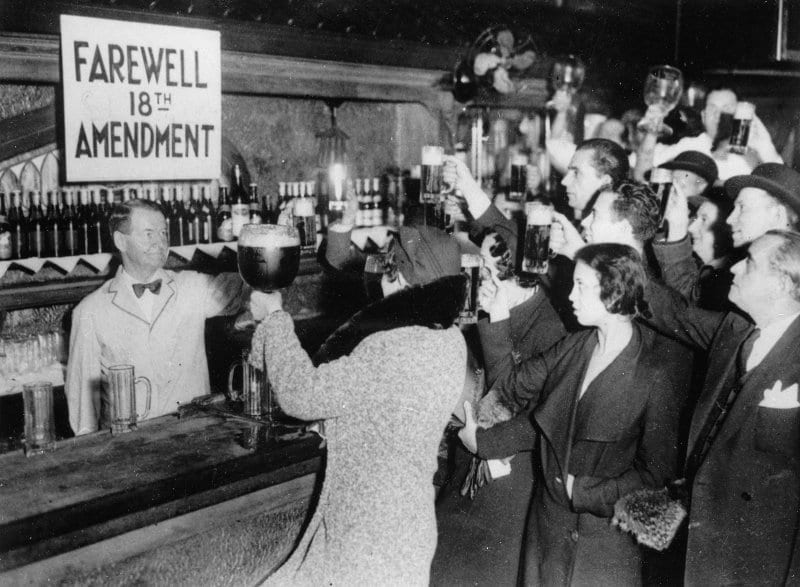The Prohibition Hangover
Yes, tied-house laws are confusing, and violating them may have serious consequences – fines, impacts on your license to do business in other states, and even potential suspension of your license.
“Tied-house” – to most people outside the alcoholic-beverage industry (and a fair number of us in the industry), this is an unfamiliar term. What is the history behind the term tied-house, and why do we have these laws?
In the United Kingdom, a tied-house is a public house (a.k.a. pub, saloon, bar) required to purchase its beer from a particular brewery or pub company. A free house, in contrast, may choose to purchase any beers from any company.
In the late 19th and early 20th centuries, bars (or saloons, as they were called then) in the U.S. were often tied-houses with exclusive brewery contracts. These exclusive supply arrangements led to fierce competition among saloons, with the result of lower prices to gain market share, and excessive consumption. This excessive consumption, due to the tied-house arrangements, led to Prohibition, or the Eighteenth Amendment, in 1919.
In 1933, Prohibition was repealed, but alcohol remained heavily regulated throughout the U.S. with the passage of the Twenty-first Amendment (this amendment allows states to enact alcoholic beverage control laws or tied-house laws). These laws were implemented for two reasons: 1) to limit the ability of large companies to dominate local markets through vertical and horizontal integration, and 2) to minimize excessive sales and consumption from overly aggressive marketing programs.
The primary method used by states to achieve these two goals was the creation of the 3-Tier distribution system (Supplier -> Wholesaler -> Retailer) and specific licensing requirements for Suppliers, Wholesalers and Retailers.
There are both federal and state (California , Chapter 15) tied-house laws, which makes compliance even more challenging. And the tied-house laws can vary between federal and state, and between states. Federal and state tied-house laws have a similar intent, but their rules differ greatly. Even those with the best intentions can run afoul of tied-house laws.
21st Century and 21st Amendment
The advent of Social Media and websites has created the potential to violate tied-house laws in new and unforeseen ways. One might think that it’s just fine to communicate the fact that your new Alsatian Riesling is now available at Whole Foods or at Bonefish Grill. Wrong!
Federal and state regulators view websites and social media pages and accounts as advertising platforms. Certain tied-house laws prohibit suppliers from providing anything of value (such as free advertising) to alcoholic beverage retailers. Announcing that your new Alsatian Riesling is available at Whole Foods or Bonefish Grill is a form of free advertising, and may result in a tied-house claim.
Some of you may ask, “But what about winemaker dinners? I thought they were OK to post on social media?” One exception to the California state tied-house laws is advertising for instructional events or winemaker dinners at retail premises. A winery may include the following in their advertisement (be sure that this exception exists in other states prior to posting):
- Name and address of the retailer (but not too prominent to the rest of the advertisement)
- Name of the wines being poured
- Date, time, location and other information about the event
- The advertisement can’t include:
- Price of the wine
- Complimentary statements about the retailer/restaurant
Thankfully, in October 2018, restrictions were eased a bit. California Assembly Bill 2452, which was signed into law by Gov. Jerry Brown went into effect January 2019. It lets wineries freely use social media to promote certain events hosted by retailers that plan to feature their wines. The new law amends several exceptions that previously allowed wineries to promote events, but also limited what a winery could include in the promotion. For instance, you couldn’t use photos of the restaurant or web address. It’s still limited, but not as bad as before.
Now What?
So how do you proceed with social media and retailer posts? Keep this Golden Rule in mind: Don’t take any action on social media where a post implies that you are supporting the restaurant/retailer. If you can answer these basic questions you should be OK:
- Is a specific retailer named in your post? If so, is it in context of an event? If no, you have most likely violated tied-house laws.
- Does this post provide value to a specific retailer? If so, you have most likely violated tied-house laws.
While we realize that this is very frustrating, it’s not worth the risk to violate tied-house laws.
Another common scenario is the post, “Where can I buy your wine?” It is legal to respond to customer inquiries, and you must list two or more retailers (not controlled by the same company). You may not mention the price in your response.
Finally, some of you may ask, “Can I list retailers on my website?” Yes, according to the CA ABC, a customer’s visit to your wine finder page is a customer inquiry and allowed – just be sure to have more than one retailer listed.
At Balzac, we work with our clients on a day-to-day basis on digital marketing programs, guiding them on best practices while avoiding any potential tied-house law infractions. Have a question? We’re here to share our expertise, help you achieve your goals and avoid any pitfalls. Be safe, know the laws and work with the experts.










